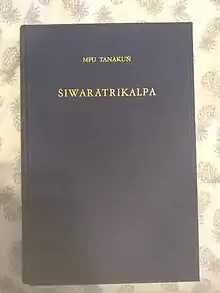Śiwarātrikalpa
Śiwarātrikalpa (from Śiwarātri, meaning Shiva's night and kalpa, meaning ritual) is a Javanese kakawin written by Mpu Tanakung in Old Javanese. It is a didactic text that describes the making of the rite of Shiva on the night of Shiva, celebrated in Bali and elsewhere. The story is related to some puranas.[1]

Summary
The Śiwarātrikalpa follows a hunter, named Lubhdaka who does not follow dharma.[2] Since Lubhdaka kills animals and doesn't follow dharma, he would not be entered into heaven according to the principles of the book.[1] During a hunt, Lubhdaka inadvertently completes the rite of Shiva on the Śiwarātrikalpa.[3] After a life of never practicing dharma, the hunter catches a deadly disease and on his deathbed cries for the wife and children he would leave behind. Shiva sees Lubhdaka and takes pity on him, telling his servants to bring Lubhdaka to Shiva's abode. When his servants ask why, Shiva responds that in the hunter's life he completed the Rite of Shiva which is a meritorious vow in the eyes of Shiva. Yama wanting Lubhdaka's soul to enter hell sends his Ganas to take him and subdue his soul to hell.[1] As the two armies of Shiva and Yama meet, they battle and Shiva's is victorious. Therefore Lubhdaka's soul is brought to heaven. [4]
Effects of the Rite of Shiva and Its Current Practice
According to the Śiwarātrikalpa, the rite of Shiva not only cleanses one of their sins but also brings them good fortune and blesses their life.[1] The rite of Shiva is still practiced today,[5] especially in Bali. [6]
References
- Teeuw, Andries; Tanakung, Mpu (1969). Śiwarātrikalpa of Mpu Tanakuṅ. An old Javanese poem, its Indian source and Balinese illustrations. Bibliotheca Indonesia. The Hague: Martinus Nijhoff. OCLC 707597217.
- Old myths and new approaches : interpreting ancient religious sites in Southeast Asia. Haendel, Alexandra. Clayton, Victoria, Australia: Monash University Pub. 2012. ISBN 978-1-921867-28-6. OCLC 795177638.CS1 maint: others (link)
- Nihom, Max (1997-01-01). "Diksa, kala and the stuti of Siwaratrikalpa 33.1-2". Bijdragen tot de Taal-, Land- en Volkenkunde / Journal of the Humanities and Social Sciences of Southeast Asia. 153 (1): 103–111. doi:10.1163/22134379-90003947. ISSN 0006-2294.
- Echols, John M.; Teeuw, A.; Galestin, Th. P.; Robson, S. O.; Worsley, P. J.; Zoetmulder, P. J. (1972). "Śiwarātrikalpa of Mpu Tanakuṅ. An Old Javanese Poem, Its Indian Source and Balinese Illustrations". Journal of the American Oriental Society. 92 (2): 361. doi:10.2307/600711. JSTOR 600711.
- Infohindu (2018-01-15). "Hari Raya Siwaratri - Malam Siwa Sebagai Perenungan Dosa". Info Hindu (in Indonesian). Retrieved 2020-04-01.
- "Jadwal Hari Raya Hindu Bulan Januari 2020, Ada Siwa Ratri dan Tumpek Pengatag". Tribun Bali (in Indonesian). Retrieved 2020-04-01.